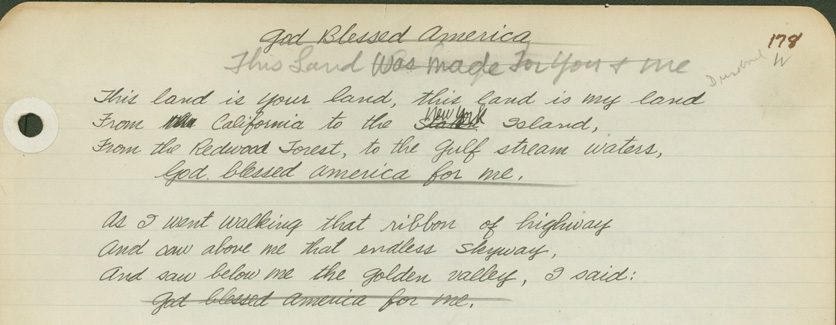
copyright Woody Guthrie Publications. Photo courtesy Woody Guthrie Center.
Woody Guthrie didn’t set out 75 years ago to write the most iconic folk song of all time. It just sort of happened. Disgusted by what he saw as the tidy patriotism of Irving Berlin’s “God Bless America,” Guthrie penned a response song, originally titled “God Blessed America.” Though he dropped the direct reference to Berlin’s work in the final draft, Guthrie kept the biting wit and social commentary.
“This Land Is Your Land” has all the components of a great folk song. The tune, borrowed from an old Baptist hymn by way of the Carter Family’s song “Little Darlin’, Pal of Mine,” is catchy and propulsive. Since the verse and chorus have the same tune, even the least musically inclined people can pick it up in a matter of minutes, which makes it ideal for that staple of folk music performance, the sing-along. That sense of inclusiveness carries over to the lyrics, where Guthrie welcomes the audience into an America governed by everyday people.
[pullquote]“The sounds of the crowd singing along to that song is what the country is all about: Work together, sing together and make a difference in our society,”[/pullquote]
According to Deana McCloud, executive director of The Woody Guthrie Center, Guthrie wrote the song while living in a rundown boarding house in New York City. He based the lyrics on experiences he had and sights he saw crossing the country. This personal touch extended to the way Guthrie wrote the song.
“Woody used a typewriter to compose many of his lyrics; however, on this song, he handwrote the lyrics,” says McCloud.
No doubt the down-to-earth familiarity of “This Land Is Your Land” is part of what has made the song an enduring classic. Though Guthrie at first neglected the song – he didn’t record the song until four years after he had written it – it soared in popularity when it got picked up by the protest movements of the 1960s. Since then it has become a staple in multiple contexts, sung in classrooms and rallies everywhere. It has been covered by many musicians, including folk legends Peter, Paul and Mary. As American as the song is, it has also spread across the globe, with groups from Britain to Sweden to Turkey making the song their own, tweaking the lyrics to fit their respective countries.
In some ways, though, success has diminished the core message of the song, which is about the hardships facing everyday Americans. McCloud notes that most people do not sing the fourth verse, about the evils of capitalism, or the final verse, in which Guthrie reflects on the lines of people he sees outside the relief office: “I stood there wondering if/This land was made for you and me.” It’s a dark thought, but one more in line with Guthrie’s original intent than the sanitized version many sing.
The power of the song continues to this day. It has such meaning for so many that it was even sung by Guthrie’s old friend, Pete Seeger, at the first inauguration of President Obama. Seeger insisted on singing the original version, with all the verses. McCloud points out the significance of Seeger’s performance.
“The sounds of the crowd singing along to that song is what the country is all about: Work together, sing together and make a difference in our society,” she says.
Maybe, in an age of renewed economic trouble, Guthrie’s song, with its mixture of despair and hope, is more important than ever.






















